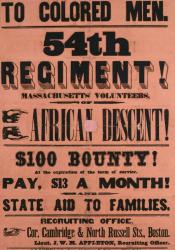Recruitment of Colored Troops in the American Civil War
At the beginning of the Civil War in 1861, black men were not recruited for the Union army. But two years later, the Emancipation Proclamation issued by President Abraham Lincoln allowed recruitment of African Americans to fight for the Union.
As an abolitionist, Massachusetts’ governor, John A. Andrew, pushed for funding and black men to join the war effort. Andrew had wanted a black regiment to fight for Massachusetts since the beginning of the war, but it wasn’t until the passing of the Emancipation Proclamation that he was able to begin recruitment for all-black regiments in Massachusetts. Andrew worked with abolitionists, both black and white, to encourage formation of an all-black regiment. Most black men were hesitant to join the United States Colored Troops (USCT), as word had gotten around that treatment of any black soldiers captured by the Confederates would be worse than treatment of a white Union prisoner. White Union officers who commanded these black soldiers would be executed if captured as well. Despite this, recruitment for a 54th and 55th Massachusetts Volunteer Infantry, all-black regiments, began just a month after the Emancipation Proclamation was issued. Governor Andrew was able to enlist 1,000 men and raise money for the regiment he hoped would stand as an example for future colored regiments. Because of the worries of black men joining the Union to fight, recruitment had to be done outside of Massachusetts as well. But by May, the 54th infantry was full.
The 54th Massachusetts Volunteer Infantry, led by Colonel Robert Gould Shaw, is best known for the Assault on Fort Wagner. Although the 54th Massachusetts Infantry lost the battle, these soldiers showed that black men were capable of fighting for their freedom just as white men were. After their valiant efforts at the battle of Fort Wagner in July of 1863, black enlistments climbed to reach a new high. General Ulysses S. Grant wrote of the black soldiers in a letter to President Lincoln that arming Negroes was a big blow to the Confederates, saying that “these Negroes were the Union’s strong ally”.
Works Consulted:
Brown, Katie O’Halloran. “Letters of Black Soldiers from Ohio Who Served in the 54th and 55th Massachusetts Volunteer Infantries during the Civil War”. Ohio Valley History, vol. 16, no. 3, 2016, p. 72-79. Project MUSE. muse.jhu.edu/article/631460.
Robbins, Peggy. “The 54th Massachusetts’ War within a War”. Military History, 2003, p. 62-70. ProQuest, https://search.proquest.com/docview/212668658?accountid=13360.

